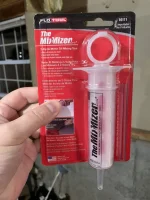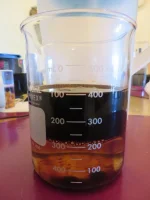Some posters have more credibility than others. I'm no mechanical Einstein, but I have sense enough to listen to those who do have ability.
LISTEN when Trav, The Critic, Molakule, clinebarger or such gives advice. Several posts ago, The Critic suggested to use a Motive power bleeder. You can buy one for (usually) less than half the cost of one dealer brake (flush). I've used mine over a dozen times on 4 cars, so my (now) cost per usage is getting in the price range of lunch at a fast food joint. To anyone who thinks you're doing any good with a "turkey baster," you're fooling yourself. Here's a picture of used brake fluid and water. So explain to me how you're removing condensation, old contaminated fluid and water from your wheel cylinders with a turkey baster unless you mount your vehicle on a Rotisserie and turn it upside down?
View attachment 35973



